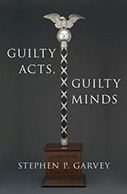Guilty Acts, Guilty Minds

Author: Stephen P. Garvey
Publisher: Oxford, UK: Oxford University Press, 2020. 334p.
Reviewer: Chad Flanders | September 2021
These should be boom times for criminal theory. Black Lives Matter, and other affiliated social justice movements, have raised deep questions about the nature and justification of the criminal law. Should prisons be abolished? Should the police be defunded? Before it might have been possible, in the words of Mary MacKenzie, to “beg the institution” of punishment—in other words, to take it for granted that societies need something like the institutions of criminal law and criminal punishment—but it no longer seems possible to do that. Stephen Garvey begins his book by acknowledging that the criminal justice system “has few friends these days” (p. 1). So we might want to ask: why should we have criminal law at all?
This question cannot be asked and answered simply at the level of doctrine—e.g., in what situations a defendant can invoke the defenses of “necessity” or “duress,” or whether felony murder should only apply to “dangerous” felonies. These are the questions that can be asked in the first-year law curriculum, and they are important and interesting questions. But theorists need to go deeper. Their questions should be more like, whatever the particularities of the doctrine, do we need, must we have, an institution that relies on using force, that cages people and tases them, to have a just society? Or is the criminal justice system an evil that we are better off without?
The title of Steven Garvey’s book might suggest that he is asking and answering traditional “doctrinal” questions about the scope of the criminal law. After all, there seem to be no more central doctrinal concepts in the criminal law than those of the “guilty act” and the “guilty mind.” There can be no crime, Augustine famously said, unless the state proves both that there was a guilty act and a guilty mind. But Garvey early on intimates that he is after bigger game. He opens his book saying he is going to focus not just on whether this or that law is just, but about whether the criminal justice system as a whole is legitimate. Does the state even have the right kind of authority to punish people?
So far, so good. Garvey is right to highlight—as a handful of other criminal law theorists have recently—that we should be thinking harder about criminal law as a political topic, not just a moral one. Criminal punishment isn’t just a matter of finding out what things are morally wrong and then making sure people suffer when they do them. It is a matter of the state building and maintaining an institution that is seemingly designed to make people suffer. And insofar as a legitimate state is a democratic one (and Garvey assumes that this is the case) it is a matter of us authorizing the state to do this to people.
But Garvey also addresses doctrine in his book, and in fact most of the book relates to doctrine, albeit in an extremely philosophical manner. The way Garvey attacks doctrinal questions is novel, and imaginative. Garvey is interested in using the answers to doctrinal questions—questions of the “guilty mind” and the “guilty act”—to set out the limits on the state’s authority to punish. Garvey reads “actus reus” and “mens rea” more expansively than the conventional notion that every crime has to have a voluntary act (e.g., not an act done out of reflex or while sleepwalking) and some culpable mental state (e.g., purpose or recklessness). In Garvey’s analysis, one cannot commit a voluntary act, and thus cannot commit a bad act, unless one had the capability to do otherwise. And a guilty mind, on Garvey’s gloss, is one that shows insufficient concern for the law. These robust interpretations of actus reus and mens rea, for Garvey, are constraints on a state’s democratic authority to punish; he cashes them out in terms of rights against the state. A statute that permits punishing someone who did not have the capability to do otherwise, or who showed sufficient concern for the law, would be unjust and outside the authority of a democratic state to enforce.
Garvey develops this idea of the criminal law’s limits by means of a contrast between the “statist” and the “anarchist.” The statist, for Garvey, turns out to be a believer in democratic politics, which doesn’t really mesh with how I would understand “statist.” Worse, Garvey’s anarchist also seems to be a sort of statist. The anarchist just believes that the state’s actions have to be justified in terms of morality, not in terms of a vote (which is what the statist believes). And even the statist believes in preventing the state from punishing people according to unjust laws. So the statist is not a democrat all the way down, and agrees with the anarchist to this extent: the state’s actions are always limited by the demands of justice.
The contrast between statist and anarchist highlights, for Garvey, whether and where we can put limits on what the state can do by means of the criminal law. Garvey is inclined to let democratic politics set a lot of criminal law. There is room for people to pass criminal laws and impose criminal sanctions in the face of some disagreement about what is just—these things can be sorted out in the “messy” forum of democratic politics. But the state doesn’t have the authority, Garvey says, to do things that violate people’s rights, as it would if the state punished people for a crime when they lacked the capacity to do otherwise or when they showed a proper respect for the law. Garvey says that the right test here is whether we would think that this or that law was “just” “beyond a reasonable doubt” given his understandings of actus reus or mens rea (pp. 81–82). I found Garvey’s book most illuminating at moments like this, when he drew lines between the things that are appropriately up for debate and those that aren’t. Some of Garvey’s line-drawing struck me as contentious, but I appreciated the point he was trying to make each time he drew a line one way rather than another.
At the heart of Garvey’s book is that we need to expand mens rea and actus reus beyond being “useful tools for parsing criminal statutes” (p. 116). But Garvey’s application and extension of mens rea and actus reus to his own ideas of capability and respect for the law sometimes lead to odd (to me) conclusions, in which showing a proper concern for the law can negate mens rea, even when one really has the required mental state for the crime. Defenses like duress, on the conventional reading, don’t act by negating the mens rea of a crime, but show that even if you did have the mens rea, there is a good reason not to hold you responsible (if I rob a bank because someone is threatening to kill my partner, then I really do want to rob the bank, it is just that I’m being coerced to do so). But if mens rea is transformed to mean “appropriate concern for the law,” then arguably my concern for the law is not negated by the fact that someone coerces me to commit a crime, even though I really do have the purpose (i.e., the conventional mental state) to commit the crime. I found myself wondering whether Garvey would have been better off making the case for getting rid of mens rea and actus reus as illuminating and useful concepts, rather than trying to reinterpret them.
This same tension—keep the traditional concepts or move beyond them—surfaces again in the last (and most interesting) chapter of Garvey’s book. Garvey sets up the chapter as a debate between the “revolutionary” and the “reformer.” The revolutionary, in Garvey’s telling, is one who believes that no one really is responsible for anything, because no one is free. The reformer, by contrast, wants to draw some distinctions between people who are really not responsible and those who are. Where the revolutionary would say that those with rotten social backgrounds and those with good enough social backgrounds are equally not culpable (because no one is really responsible for anything), the reformer will say that those with “good enough” backgrounds can be held responsible.
I found this discussion engaging, but I didn’t recognize in Garvey’s “revolutionary” the full position that I see advanced in debates about abolishing prisons and defunding the police. Those movements do raise questions of responsibility, but they also look at what the state does to people by punishing them and who gets punished. Garvey, I’m guessing, is appalled at modern prisons, the practice of the death penalty, racial inequality in punishment, and abusive police practices, but he doesn’t say much about them in his book. The case that Garvey uses to open up Chapter Six crucially involves race, but race does not play much of a part in Garvey’s discussion of it, and even then mostly obliquely. Race doesn’t figure anywhere else in the book. One can’t complain about the book an author didn’t write, but there is a question of scope here when it comes to issues of legitimacy. Can we properly consider the legitimacy of this or that criminal law without also thinking about the consequences of violating that law and how and when it gets enforced? A law that punished littering might look okay, unless the approved sanction for littering was 2–5 years in prison and the law was enforced arbitrarily.
In other words, I worry that if we don’t face head-on the fact of punishment when considering questions of mens rea and actus reus, we don’t really get the full picture of why the criminal law seems so problematic to many. We might agree with Garvey’s bottom line that some “core crimes” (roughly, mala in se crimes) when committed by those who were capable of doing otherwise and knew what they were doing was unlawful deserve a response, but why is that response properly punishment in prisons and jails or by extensive supervision by the state? It seems strange that a book that opens with the example of a statute allowing punishment of up to six months in jail for using the slogan “give a hoot, don’t pollute” for profit wouldn’t pause to ask: do we really need prison for that? Prison seems to operate as the presumptive remedy for crime for Garvey, as his stylized social contract hypotheticals early on in the book illustrate (people get put in the “cage” for violations of the code of Anarchia island). But why take that as a given for all crimes, even for core crimes? Is caging people the only way to get to social conformity? I wish that questions of punishment loomed larger in Garvey’s book. Indeed, one might say that the distinguishing mark of the criminal law is not necessarily in what in prohibits, but in how in enforces those prohibitions. To fully consider the criminal law, then, and its legitimacy, our inquiry is be incomplete unless we look at punishment. (Perhaps this is for volume II of Guilty Acts, Guilty Minds.)
Garvey’s book ends on a revealingly modest note. There probably aren’t many instances, Garvey guesses, of states flagrantly passing laws that violate his actus reus and mens rea requirements. These requirements may be useful only in “some cases,” when lawmakers or prosecutors push against the bounds of their authority (p. 309). And again, recall that Garvey’s standard for limiting the authority of the state in criminal law is whether doing so would prevent an injustice “beyond a reasonable doubt.” That is a rather high bar, and I worry that many of our current (awful) criminal laws and current (awful) forms of punishment might pass muster. One of Garvey’s conclusions is that a law that made it a crime merely to “act in a way one believes to be criminal,” even though no substantive criminal law provision is violated, would clearly be “unjust” (p. 197). I would hope so!
Garvey’s book is filled with profound insights, and rather ingenious and thought-provoking tests for determining a person’s culpability (e.g., the Stephens test, the Jekyll test, the Lex test). Garvey uses vivid just-so stories to get his points across and one can tell, via his in-depth discussions of American law, that Garvey is an editor of the leading criminal law casebook in the United States. People who want to think deeply about the criminal law’s doctrinal categories, and ways to creatively move outside of them (while still hanging onto them) are going to like and benefit from Garvey’s book.
Garvey admits, in the very last sentence of his provocative book, that his effort is just a “start” (p. 309). This is overly modest. But Garvey is correct in this respect: his book should encourage others to ask the larger questions of not only how, but whether, we can justify what the criminal law does to people, ostensibly in our name.
Chad Flanders, Professor of Law, Saint Louis University School of Law


